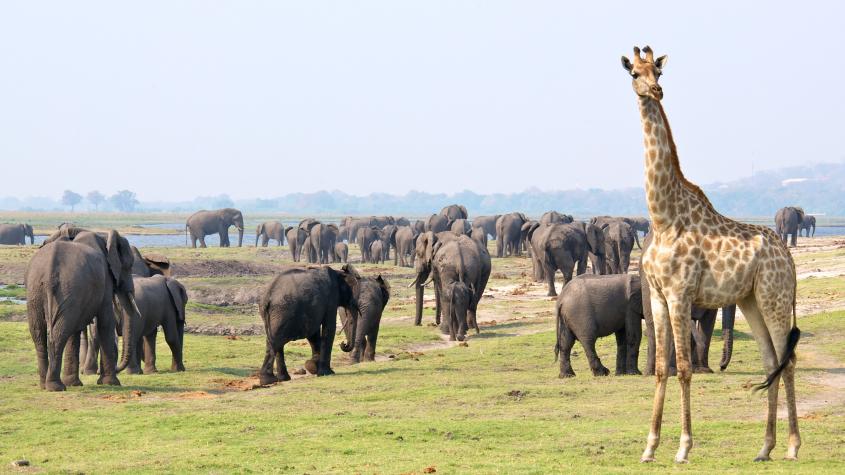$1.7M grant from Rockefeller Foundation paves way for Planetary Health at Cornell
ITHACA, N.Y. – The Cornell University College of Veterinary Medicine (CVM) is excited to announce $1.7 million in grant funding from The Rockefeller Foundation for work in support of the Planetary Health Alliance, a consortium developed with Harvard University’s T. H. Chan School of Public Health. Planetary Health is a field born out of the urgent need to improve our understanding of the public health impacts of human-caused environmental change, so as to be able to inform land- and ocean-use planning, environmental conservation, and public health policy. The Planetary Health Alliance (PHA) emphasizes using sound science to fuel policy and action in order to secure a future for the health of human civilization and the state of the natural systems upon which it depends.
CVM has a suite of research, policy, outreach and educational programs underway focused on how human health, wildlife health, domestic animal health, and the health of the environment are all inextricably linked. For example, CVM is working closely with southern African partners to address diseases impacting the 200,000 square mile Kavango Zambezi Transfrontier Conservation Area (also known as “KAZA”), the largest land mass dedicated to wildlife conservation as linked to sustainable development in Africa if not the world. A collaborative effort among Angola, Botswana, Namibia, Zambia and Zimbabwe, the area is home to spectacular wildlife, including approximately 250,000 elephants, likely more than half of all of the elephants left in Africa. Addressing disease issues of importance to the international trade of beef from local cattle is critical here in order for wildlife and livestock to finally be able to peacefully coexist. The Rockefeller Foundation is supporting CVM’s efforts to ensure the poorest livestock farmers living closest to wildlife are no longer excluded from global beef markets, and veterinary cordon fencing, which has devastated wildlife for decades by blocking key migration routes, is no longer the only option for managing foot and mouth disease in southern Africa.
“If livestock agriculture is no longer solely dependent on veterinary fencing to deal with foot and mouth disease, then KAZA’s vision for the restoration of major movement corridors for the region’s spectacular wildlife indeed has a chance of being realized,” said Steve Osofsky, the Jay Hyman Professor of Wildlife Health & Health Policy at CVM, who leads the work. “In addition, by producing meat in a way that solves the foot and mouth virus problem, livestock farmers previously excluded from accessing markets may for the first time be able to find traction in the wider regional economy, and beyond. This can only help families move out of poverty and improve prospects for healthier lives and sustainable livelihoods.”
CVM is looking at a range of other Planetary Health case studies to document how science can best serve the needs of policy makers around the world. For example, Rockefeller Foundation-supported research led by PHA partners at Harvard and Columbia universities on the connections between the emissions generated by the intentional burning of lowland forests to clear land for palm oil production in Indonesia and downwind population health impacts has facilitated an important opportunity to help protect both Indonesia’s remaining forest and public health at the same time. CVM and PHA have also been engaging the United Nations Environment Programme (UNEP) and the World Health Organization (WHO) to discuss the benefits of a Planetary Health approach and how our understanding of the critical range of relationships between the state of natural ecosystems and human health can inform the implementation of the Sustainable Development Goals.
Cornell University is also taking advantage of lessons learned from this very applied work to inform the world’s first degree-granting program focused on Planetary Health. Cornell’s new Master of Public Health (MPH) program will have its inaugural class starting in September, with an initial focus on sustainable food systems and on how better stewardship of the world’s remaining ecosystems can potentially be a cost-effective “upstream” approach to protecting public health.
“For more than 100 years, The Rockefeller Foundation has been committed to human health and well-being, and to supporting the institutions and leading thinkers who are driving progress,” said Michael Myers, Managing Director for Health at The Rockefeller Foundation. “Today, we can’t think of human health without considering the health of our planet. Cornell’s College of Veterinary Medicine and the Planetary Health Alliance are at the forefront of building the new and very applied field of Planetary Health. We are pleased to support their work.”
- - - - - - - - - - - - - - - - - - - - - - -
Cornell University College of Veterinary Medicine is a global leader, with a mission to advance veterinary medicine at the interface of discovery and application. We promote research at the molecular, cellular, organismal, and population levels to better inform the practice of medicine, public health, and policy. We are dedicated to excellence in research, educational programs and professional service. We seek to advance understanding of both animal and human health, foster open collaboration across disciplines and institutional boundaries, and integrate discovery with application. To learn more, please visit https://www2.vet.cornell.edu.
The Planetary Health Alliance, based at Harvard ‘s T. H. Chan School of Public Health, is a consortium of universities, NGOs and other partners with a shared mission—supporting the growth of a rigorous, policy-focused, transdisciplinary field of applied research aimed at understanding and addressing the human health implications of accelerating anthropogenic change in the structure and function of Earth’s natural systems. To learn more, please visit http://planetaryhealthalliance.org/.
For more than 100 years, The Rockefeller Foundation’s mission has been to promote the well-being of humanity throughout the world. Today, The Rockefeller Foundation pursues this mission through dual goals: advancing inclusive economies that expand opportunities for more broadly shared prosperity, and building resilience by helping people, communities and institutions prepare for, withstand, and emerge stronger from acute shocks and chronic stresses. To achieve these goals, The Rockefeller Foundation works at the intersection of four focus areas—advance health, revalue ecosystems, secure livelihoods, and transform cities—to address the root causes of emerging challenges and create systemic change. Together with partners and grantees, The Rockefeller Foundation strives to catalyze and scale transformative innovations, create unlikely partnerships that span sectors, and take risks others cannot—or will not. To learn more, please visit www.rockefellerfoundation.org.
Melissa Osgood
office: 607-255-9451
cell: 716-860-0587
mmo59@cornell.edu






